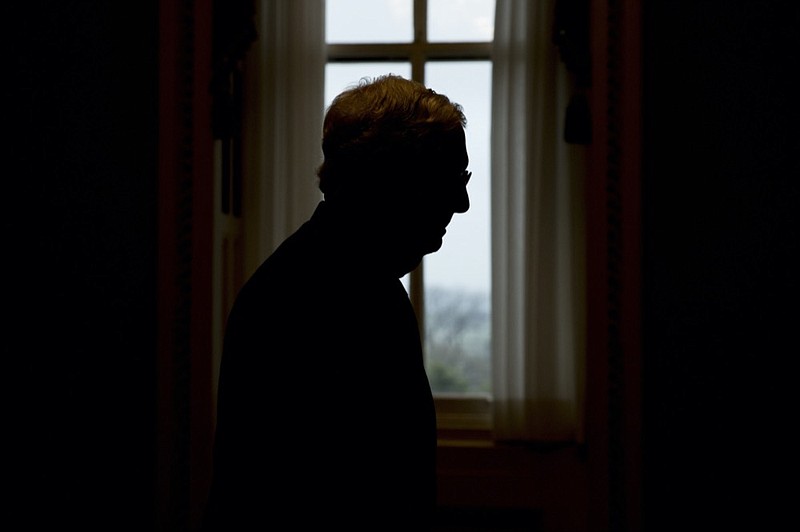NO: The Senate is unlikely to end this parliamentary procedure
Could abolishing the filibuster to enact the For the People Act be the one reform of Senate procedure to unlock more ambitious democracy reforms? This is the dream of many congressional Democrats, but likely a dream that will be unfulfilled.
Democrats are enthused by beating Donald Trump, unexpectedly winning two Georgia runoff races and taking control of the presidency and both houses of Congress for the first time since 2010. Yet that enthusiasm should be tempered by the 50-50 Senate, understandable resistance to doing away with the filibuster, and the democracy reform bill, For the People Act, that is too big, raises significant federalism concerns and lacks bipartisan support.
Many familiar arguments against the filibuster might prevail even if Democrats had a larger majority in the Senate. What would Republicans do in the absence of the filibuster in the future when they are in the majority? Would it change the character of the Senate to make it more majoritarian like the House and thereby take away important prerogatives of individual senators? Would it undermine bipartisanship in the Senate by encouraging Senate majorities to pass measures on a majority vote rather than seeking some votes from the minority?
But with a 50-50 Senate the questions are multiplied. Key Democratic senators such as Joe Manchin and Kyrsten Sinema have sympathy for the filibuster, but are also in a tough political position. A vote to abolish the filibuster would be followed by two years of tough votes on key Democratic priorities. Would Manchin want to be seen as Mr. No on a series of votes that are important to the progressive base of the party? With the filibuster in place, he is only one vote in the quest to secure 60 votes to break a filibuster. In the post-filibuster Senate, he is the deciding vote.
If abolition of the filibuster is unlikely, passage of For the People Act is more difficult.
First, the act is not only long in pages (866), but enormous in scope. It is the omnibus bill of democracy reform. It includes: Election administration, including expansion of voting by mail and undercutting voter ID laws; campaign finance reform, including new modes of public financing; ethics reform; redistricting reform; and precursors to a new voting rights act and preparation for the admission of new states.
Each of these subjects is complex, with many detailed provisions, requiring extensive hearings and debate. Past efforts have seen smaller, stand-alone bills fail or the passage of modest compromise bills.
Second, federalism is important in the conduct of elections. It is not the case that the Constitution puts elections solely in the hands of the states. Congress by law can preempt state election laws. But the Constitution's language starts with the assumption that states will be the first place where election laws are made: "The Times, Places and Manner of holding Elections for Senators and Representatives, shall be prescribed in each State by the Legislature thereof."
Throughout our history, elections have been mostly the province of states with local administration. In key areas such as voting rights, voter registration, overseas voting and the post-2000 Help America Vote Act, Congress has passed federal laws. But more important, even with some federal laws, the federal government does not directly administer elections. This federalism leads to differences among the states, many of which are jealously guarded.
States such as Oregon and Washington have been voting nearly exclusively by mail for a number of years, while other states have employed mostly polling place voting. The hours of voting, purchase of voting technology, rules about photo ID, many details about voter registration and many other topics have their own particular look in each of the states, and attempts to impose a federal standard will likely engender push-back. We might even see local Democratic election officials criticize aspects of the bill, not necessarily on the aims, but on the means of implementation.
Finally, the For the People Act is unlikely to garner Republican support. The House-passed version received no Republican support. While not a requirement, most of our major election administration legislation has had significant support from both sides. And in a number of instances, the act undoes past compromises, such as imposing a single standard on how to handle voters showing up at the wrong polling place, limiting maintenance of voter lists based on unanswered mailings.
If election reform is to occur, it will likely be on more discrete topics, at the state level, and with at least partial support from both parties.
John C. Fortier is a resident scholar at the American Enterprise Institute. He wrote this for InsideSources.com.
Tribune Content Agency
YES: This 'accidental' procedural tactic needs to go
It began as an accident, morphed into a parliamentary tool extensively used to block civil rights legislation, and today has grown into a partisan gambit threatening to obstruct democracy reforms and, for that matter, the entire policy agenda of the new Biden administration. It is called the filibuster.
There is nothing in the U.S. Constitution that provides for the filibuster. In fact, it is anathema to what the founders envisioned for the legislative process. Noting the standstill of the legislative process under the supermajority vote requirements of the Articles of Confederation, the founders wrote a new Constitution fundamentally based on majority rule. Alexander Hamilton wrote in Federalist 22: "If a pertinacious minority can control the opinion of a majority ... (the government's) situation must always savor of weakness, sometimes border upon anarchy."
Instead, the filibuster came into existence very much unwittingly and by mistake. Both the House and Senate rule books included the "previous question" motion, which allowed each body to cut off debate by a simple majority. In 1805, Vice President Aaron Burr, recently indicted for the murder of Alexander Hamilton, presided over the Senate and argued that the "previous question" motion was superfluous, and so the Senate deleted it from the rulebook. No one contemplated that the deleted "previous question" motion could empower a senator to keep the floor indefinitely and prevent a vote on a motion until decades later, with the first filibuster in 1837.
Back then, the filibuster was a "talking filibuster" in which senators had to stand on the floor and talk 'til they dropped. It really was not used often before the Civil War. The filibuster eventually did become a nuisance to the legislative process, so the Senate adopted a compromise reform to cut off debate by a supermajority vote in 1917, known as the "cloture" rule (Senate Rule 22).
Today, the filibuster has become a routine tool to derail a majority party's legislative agenda. Filibusters now are managed more like a poll of the Senate. If Senate leaders know that at least 41 senators would oppose a cloture motion on any legislative measure, that measure usually will not be scheduled for floor consideration. The startling frequency of such informal filibusters today can be measured by the number of cloture motions, which have gone from one or two cloture motions per session before the 1960s to 150 to 250 cloture motions today.
Following the tidal wave of scandals and corruption and efforts to suppress voting rights over the last four years, and in recognition of longstanding issues with our democracy, congressional Democrats have put together a massive legislative package to strengthen our system. The For the People Act would establish automatic voter registration, make voting by mail and early voting easy, ban gerrymandering and enhance election security. The legislation would enhance transparency of money in politics and replace the corrupting system of special interest financing of elections with a small-donor matching program to reduce the role of Big Money in elections. It would strengthen governmental ethics by applying the conflict-of-interest rules all the way up the government hierarchy, including the president and vice president, and empower the Office of Government Ethics to enforce these rules, and much more. In short, the For the People Act is the cure to the ills of government for which we have all been waiting.
But the dysfunction caused by the filibuster could strangle much of the Democratic majority legislative agenda in the 117th Congress. And Senate Minority Leader Mitch McConnell has signaled that he will filibuster these democracy reforms to the death.
The filibuster, as it currently stands, is the single greatest obstacle to protecting us from voting access attacks happening at the state level, restoring election integrity and reining in special interest control over our government. This is reason enough to end the filibuster as we know it. There are a number of different steps that could be taken, from restoring the talking filibuster to exempting democracy reforms from the filibuster or, better yet, casting this accidental parliamentary mistake back into the dustbin from which it crawled.
As the 2020 elections demonstrate, the American people of all partisan persuasions are tired of the congressional gridlock and the scandals and corruption that have come to define Washington. Americans want sweeping change. It is what we voted for. Let's not allow a parliamentary gimmick to block desperately needed democracy reforms and leaving us forever stranded in a legislative quagmire.
Craig Holman serves as Public Citizen's lobbyist on ethics, lobbying and campaign finance rules.
Lisa Gilbert is Public Citizen's executive vice president. They wrote this for InsideSources.com.
Tribune Content Agency



